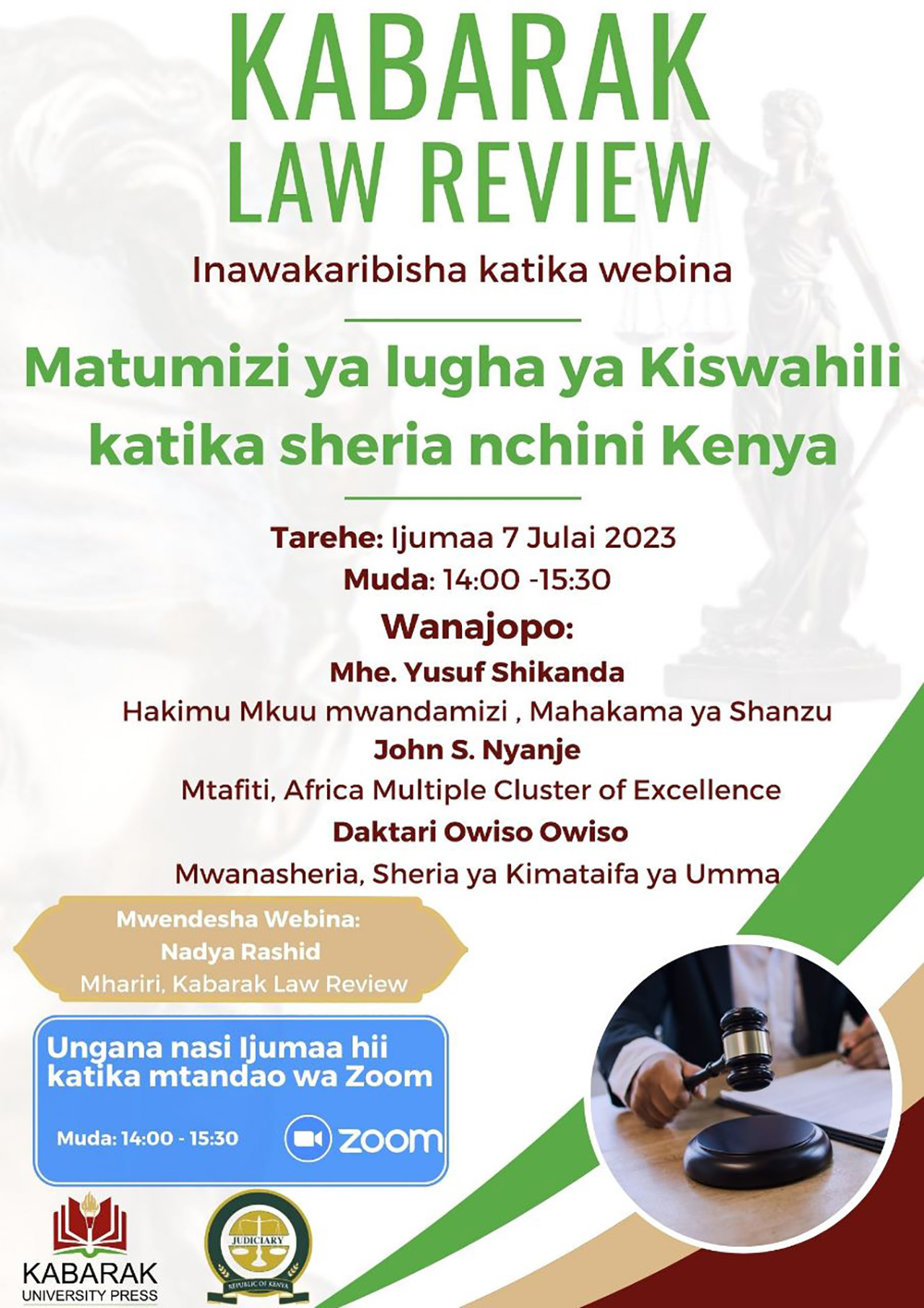Punde tu baada ya Kenya kupata uhuru, nchi yetu ilirithi sheria ya wakoloni. Korti zetu zikaendelea kutumia sheria ya mzungu, licha ya kuwa na asilimia ishirini pekee ya wakenya walioielewa kuielewa lugha hii ya mkoloni ambayo sharia hio iliandikwa kwayo. Inashangza sana kuwa katiba yetu ya kwanza iliandikwa kwa kimombo vile vile, Katiba yetu iliandikwa kule Ulaya. Labda hii ndio sababu ya Kiswahili kudharauliwa hadi sasa. Mawakili wa Afrika waliipa fahari lugha ya mkoloni na kuendelea kuitumia. Kizungu kikajulikana kama lugha ya wasomi. Kujua Kizungu ikawa ishara ya usomi. Mkenya wa kawaida akatupiliwa mbali. Akahukumiwa kwa lugha ii hii, lugha ya mzungu. Je, huu ni uungwana?
Mnamo tarehe 7 Julai 2023, Chuo Kikuu Cha Kabarak kinatarajia kukaribisha wakenya wajadili swala hili kwa kina. Mjadala huu utafanyika kwenye matandao. Je, kuna lugha bora kuliko nyingine? Magwiji na wasomi mbali watajiunga nasi. John S Nyanje, Hakimu Yusuf Abdallah Shikanda pamoja na Daktari Owiso Owiso watakua miongoni mwa wanajopo. Isitoshe, Nadya Rashid, Kipkorir Caleb na Nyakundi Christopher ni miongoni wa wanafunzi wa Chuo Kikukuu cha Kabarak watakaojiunga na jopo hili. Fatma Slim atawakilisha Chuo Kikuu cha Nairobi, Mombasa, katika haya majadiliano.
Dhamira kuu ya malumbano haya ni kukuza Lugha ya Kiswahili. Siku hii imechaguliwa kwa kuwa ni Siku ya Kiswahili duniani. Isitoshe, ni siku ya waliopigania uhuru wa pili. Basi, hii siku ni bora zaidi kwa kuwa ni kumbukumbu tosha ya Saba Rally na Siku ya Kiswahili Duniani. Isitoshe, tutaweza kujadiliana: Changamoto zinazokumba matumizi ya Kiswahili katika sheria, kupigania utafsiri wa sheria maalum kwa lugha ya Kiswahili, Kuhumiza uchapishaji wa majarida ya sheria katika lugha ya Kiswahili na kushirikiana na wasomi katika nyaja mbali ili kuyafikia malengo haya.
Mpango huu utaweza kusaidia katika kukuza mswada wa kisheria. Wakenya wengi wataweza kuielewa sheria na usajili wa mahakama. Hii itaweza kupunguza maombi ya kukata rufaa katika korti ya Kukata Rufaa nchini. Kwa mfano, iwapo mshatakiwa amekubali mashtaka aliyosomewa kwa lugha asiyoilewa, ni njia ipi atakayoitumia kupata haki? Hukumu ikisomwa katika lugha ambayo mshtakiwa haielewi, tunaweza kusema ana haki? Iwapo shahidi anadodoswa katika lugha geni, hivi, atayaelewa maswali anayoulizwa? Atawezaje kuwasilisha ushahidi wa kweli na wa haki. Kwa hivyo, ni bora tuitafsiri sheria yetu kwa Kiswahili ili tuupe maana msemo; ujinga kamwe si kingo.
Basi, tunawahimiza wakenya wote wajiunge nasi katika siku hii ya kihistoria tunapokunjua jamvi la kuswahilisha sheria. Isitoshe, hii ni siku ya kukumbuka waliojitolea mhanga katika kupigania demokrasia yetu. Webina hii ni mwanzo tu wa kuhakikisha kila mkenya wa tabaka lolote lile ataweza kupata haki katika mahakama yetu. Njooni nyote tujitoe katika minyororo ya ukoloni. Tuipe fahari lugha yetu na Uafrika wetu. Usikose!
Report on the Kiswahili webinar on Matumizi ya Kiswahili katika sheria nchini Kenya
After Kenya gained independence, our country inherited the laws of the colonisers. Our courts continued using European laws written in English, despite only a small percentage of Kenyans understanding this language. It is astonishing that our first constitution was written in English and our constitution written in Europe. Perhaps this is the reason why Swahili has been disregarded until now. African lawyers took pride in the language of the coloniser and continued to use it. English became known as the language of the educated. Speaking English became a symbol of knowledge and the ordinary Kenyan was sidelined. They were judged based on this language, even though this is the reason they distrust the court system. Is this even fair?
On 7 July 2023, Kabarak University invites students and scholars to discuss this issue. This debate will take place virtually. The webinar will feature scholars and practitioners of law including: John S Nyanje, Yusuf Abdallah Shikanda, Principle Magistrate, Shanzu Law Courts and Dr Owiso Owiso. Nadya Rashid, Kipkorir Caleb, and Nyakundi Christopher are among the students from Kabarak University who will join this panel. Also, Fatma Slim will represent the University of Nairobi, Mombasa Campus, in this discussion.
The main purpose of this debate is to recognise and promote the use of the Swahili language. This day has been chosen since it is Siku ya Kiswahili Duniani (International Kiswahili Language Day). Furthermore, it is the day of second liberation fighters. Hence, this day is even more significant as it commemorates both the SabaSaba Rally and the Siku ya Kiswahili Duniani. Additionally, we will be able to discuss: Challenges facing the use of Ksiwahili in law, advocating for the translation of specific laws into Swahili, promoting the publication of legal journals in Swahili, and collaborating with scholars in various fields to achieve these goals.
This plan will help enhance legal aid services. Many Kenyans will be able to understand the law and court proceedings and this can reduce the number of appeals filed in the Court of Appeal. For example, if an accused person accepts charges read to them in a language they don't understand, how will they seek justice? If the judgment is read in a language the defendant doesn't comprehend, can we say they have received justice? If a witness is questioned in a foreign language, will they understand the questions? Will they present true and fair evidence? Thus, we encourage all Kenyans to join us on this historic day as we unfurl the banner of Swahilising the law. Moreover, this is a day to remember those who sacrificed for our democracy. This webinar is just the beginning of ensuring that every Kenyan, regardless of their social status, can access justice in our courts. Come one, come all. Let us all free ourselves from the chains of colonialism. Let us take pride in our language and our African heritage. Don't miss out!



